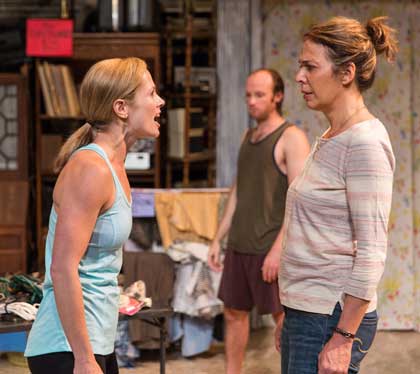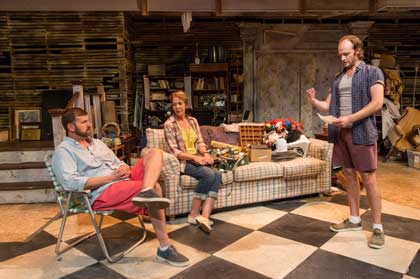Play
by Branden Jacobs-Jenkins
Directed by M. Bevin O’Gara
Speakeasy Stage Company
Boston Center for the Arts
South End, Boston
September 12 – October 11, 2015
With Bryan T. Donovan (Bo), Katie Elinoff (Cassidy), Tamara Hickey (Rachael), Melinda Lopez (Toni), Brendan O’Brien (Ainsley), Alex Pollock (Franz), Eliott Purcell (Rhys), Ashley Risteen (River)

Alex Pollock as Franz
Melinda Lopez as Toni
in “appropriate”
Photo: Nile Hawver/Nile Scott Shots
Courtesy of Speakeasy Stage Company
A deceased father in Arkansas, a lifelong packrat, leaves inordinate amounts of junk for his three grown children to go through. They are relatively alienated from one another, and Franz (Alex Pollock) is by far the most so, having been estranged years before. But they do come together, with their partners and/or children present, to sort through the stuff, and come upon some surprising, and disturbing, discoveries.
If you have been involved in the process of going through a parent’s collection of possessions in resolving an estate, you may want to take a pass on this sometimes funny, sometimes tragic, reflection on the process. For one not so involved, the undergoing may seem arcane and unexpectedly strained. For those with experience, it is like cinéma vérité.
There are a lot of interesting transitions and curious plot connections in this somewhat intricate tale involving the permutations of relationship between these three siblings and their families. To get all of the siblings to air their dirty laundry and to get the various children and partners to enter the fray in the time allotted involves a certain amount of deft writing.
There is also a certain amount of windiness in the writing; the play might do better with a few judicious cuts here and there. Especially towards the end, it begins to feel like a Beethoven symphony, appearing appearing to come to its completion multiple times before it actually does. In Beethoven that attenuation is dramatic; here it just feels drawn out.
When the end does finally come, however, it is concise and potent, but it is preceded by a few extra twists and turns which might have been avoided.
Quite a lot of the give and take is punchy and interesting, but it too gets a little belabored at a certain point.

Melinda Lopez as Toni
Alex Pollock as Franz
in “appropriate”
Photo: Nile Hawver/Nile Scott Shots
Courtesy of Speakeasy Stage Company
Alex Pollock as Franz gives a rapid-fire and very funny long monologue well into the second act. It is quite a tour de force delivery given in service to Franz’ new found redemptive vision. His whole interaction with River (Ahsley Risteen) is full of hysterical little twists and sets up a juicy conflict with the two other siblings, Toni (Melinda Lopez) and Bo (Bryan T. Donovan) throughout.
Melinda Lopez is a compelling actress, but part of the problem with her performance here is that she is too appealing for the role. She gives it good effort, but when it comes time to be straightforward about the unwelcome discovery in her father’s closet, the character’s response is weird and full of denial, and one can’t quite believe that Lopez, who exudes a kind of warmth and trust, could actually feel that way.
Bryan T. Donovan, as the straight, businesslike, brother, does quite well conveying his role, though, at the end there is an emotional moment which doesn’t make a lot of sense. That might well be more of a problem with the script than with the performance.
Bo’s wife, Rachael (Tamara Hickey) is Jewish and the play includes some pretty weird dialogue that refers to her Jewishness. I’m not sure where the playwright is coming from with that, but it felt strange, and not as funny as it seemed intended to be.
The playwright, Branden Jacobs-Jenkins, is African-American, and has written a play that includes an almost all-white cast (except for a single, African-American walk-on at the very end), but that has them wrestle with a racial theme. It’s an interesting setup, and the theme is powerful enough to drive the play forward with significant energy.
There is an extended fight scene meant to provide a kind of choreographed slapstick, but it goes on way too long. It’s way over the top.
In its best moments, this play is highly suggestive and raises a lot of questions, many of which don’t get answered. Overall, its considerations of prejudice and violence are thoughtful and stimulating, and, in the end, it achieves a flash of drama that conveys the tragic essence potently.
– BADMan
Leave a Reply